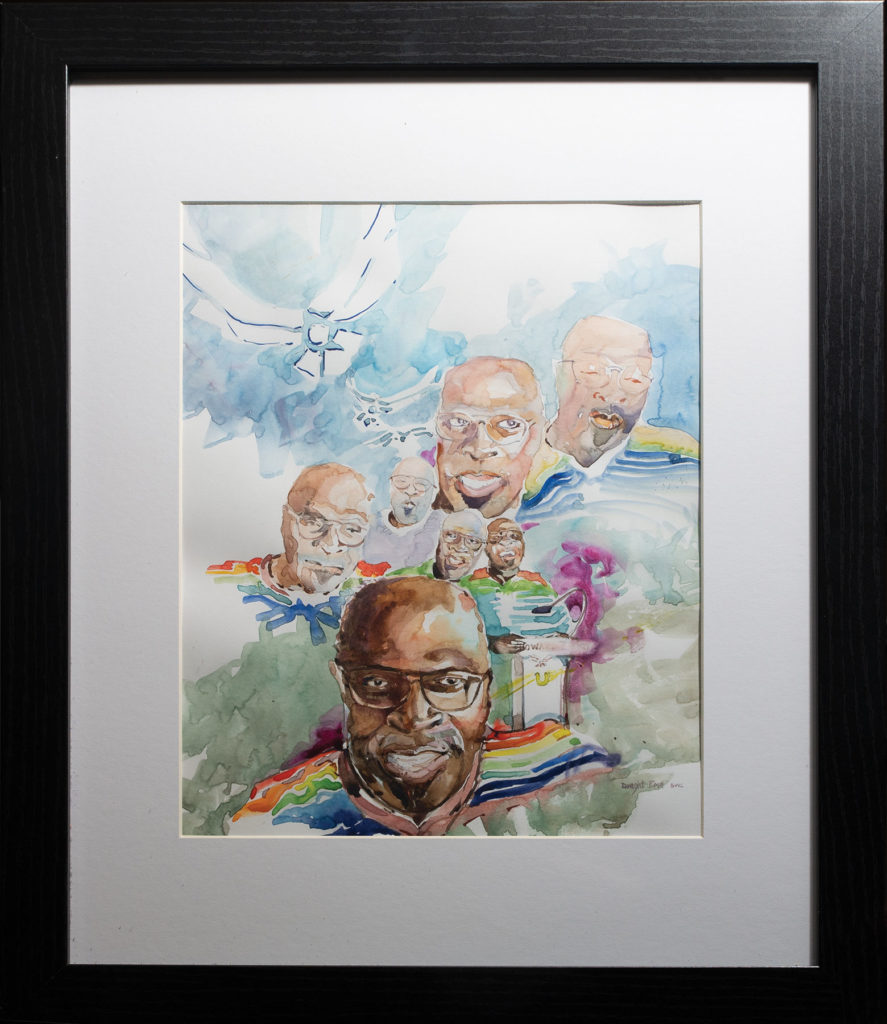
Dwight Rose
14″ x 17″ • Watercolors
Artist Statement
My works are based on the principles of good graphics, which comprises the use of line, and the modeling of light and experimentation with color. A drawing is done where the line provides the foundation for the subject. Through experimentation with color shifts I can create contrasts.
I use wet in wet watercolor washes, which usually sets the style for my work, a continuous layering of pigment creating translucent glazes of paint often applied in parts intuitively. Textures are created using a variety of techniques and tools. Also creating depth through contrast, which in turn gives the paintings weight and substance.
Working towards a style that combines traditional painting techniques along with inherent personal characteristics, is the impetus behind this piece.
Facebook: dwight.rose.520
Twitter: @dwightrocks1
Instagram: @watercolorimpressions
Youtube: dwightrose
by Trish Stukbauer
Can you remember who you were, before the world told you who you should be?”
— Charles Bukowski
The last six months of his Air Force career were by far the most mentally taxing for Chief Master Sergeant Carlton Clayton’s exemplary 30 years. One of seven children, Carlton joined the Air Force upon graduating high school after seeing his brother receive accolades for his military service. While Carlton good-naturedly jokes that he never received the same amount of praise his brother seemed to get, it was 30 years well spent in service to his country, his team, and his career. That’s why he didn’t want to throw it all away by revealing who he truly is.
“It was a horrific dilemma faced by countless service members during and before the era of “Don’t Ask, Don’t Tell.”
The false assumption that LGBTQ+ people would somehow undermine the military’s combat readiness forced those who wished to serve underground, having to choose between hiding their sexuality or giving up their service careers.
Carlton navigated those mentally treacherous waters throughout his 30 years. He chose his friends carefully. He was cautious not to date within the service. If he wanted to go to a gay nightclub, he’d make the trek to Dallas for fear of being seen at the local establishment that was literally next door to his home. It colored the way he served in a different way – it forced him to aim higher.
“That’s what kept me at the top of my game. We had to be better than all the rest,” he reflects. I heard someone make a comment once. He said, ‘You can easily find all the gay people in the military by looking at their personnel records.’ Meaning that they were spotless. And that’s where we had to be.”
Excelling came naturally to him. One of four boys and the only one to graduate from high school, he ran track and became accustomed to being part of an exceptional team. That was an expectation he carried into his service. He demanded a high level of professionalism and operational readiness from himself, his superiors, and his subordinates.
Carlton was in Saudi Arabia during the Gulf War, serving as part of a special detachment that was not supposed to be engaged in combat. From the relative safety of their own housing in a military compound, he and his brothers grew so accustomed to the sound of shelling that they learned to sleep right through it. When the biggest complaint he heard was that the Patriot missiles didn’t allow them to sleep the previous night, Carlton bristled, because he felt no one was thinking about the men in the field and what they were enduring as the Scuds exploded above their heads.
Carlton’s final six months in the service were the worst as he realized what he would lose if he was exposed as a gay man.
“I realize how some people can commit suicide, because if I was that type of person, I think I would have done so,” he recalls. “The closer I got to retirement; the weight just felt heavier. I would go outside at night and look at the sky, one star in particular in Orion… I would look at it and say, ‘you only have five months to go, you can get there.’ But it was hard getting there.”
The news reporting in Saudi Arabia offended Carlton. They would report Scud attacks and claim that the missiles landed in lakes around Riyadh. However, there were no lakes in the city. He and his friends would drive out the next day to see apartment buildings missing entire walls. A sense of safety reigned in the American compound however, as they seemingly flew under the radar.
In his personal life, Carlton continued to fly under the radar as well. He knew many other officers and enlisted personnel who were gay, including at one point his roommate, but it was never mentioned and certainly not discussed – in the open or in private.
What also was never discussed was an incident involving a captain in Saudi Arabia. This particular security officer disappeared for five days and went scuba diving in the Red Sea while those on base searched for him. Later, the same man and several companions went out into the dessert…
“looking for something to happen. They were spotted by a group of Iraqis. The Iraqis came towards them, and those guys were unarmed, and being unarmed they didn’t know what to do. They couldn’t run because they were in the Iraqi’s line of sight. They were so frightened they pissed themselves knowing they were gonna get shot. But just as the Iraqis get closer, they fall to their knees, drop their weapons and surrender,”
The security officer who had disappeared for five days returned to the states amidst accolades and medals, while the other men who were with him grunted at the newspaper coverage of the officer’s ‘courageous exploits’ – minus the urine-stained fatigues of course.”
Carlton honed his writing skills while in Korea as part of an aircraft maintenance squadron where he wrote performance reports. Getting the reports in on time was critical, and when other staff members didn’t do them – or superiors failed to sign them – it fell on Carlton. Over time, he ended up writing almost all of the reports, and signing many with the commander’s blessings – in order to meet the important deadlines. It wasn’t a stretch for this man for whom education was paramount. He always wanted to teach and was able to do so in a fashion while in the Air Force.
Now retired, he is pursuing a dream he’s had since fifth grade – to be a high school teacher. He’s working through the process to pick up the credentials he lacks. Spending some time as a substitute teacher only fueled that desire.
During his decades in the Air Force, Carlton took classes whenever he could, soaking up both knowledge and the classroom environment. “I just wanted to be on the other side of the podium, and I wanted to be the one teaching these things,” he recalls. Carlton passed on his love for education, telling his older nieces and nephews that if they graduated from high school, he would put them through community college.
“I just wanted them to have something greater than what they had.”
At one point during his last days in the Air Force, Carlton realized that much of the pressure to conform was self-inflicted – a trauma response from decades of hiding who he was.
“I got to the point where I said well I don’t care who knows because I have nothing to lose now, he recalls. No one was paying attention to me at that point. As I look back now, I brought all of that stress on myself.”
The administration specialist had a retirement ceremony he’ll never forget. His boyfriend was sitting next to him in the stands, watching the parade pass in front of 2,000 service members. The commander was on Carlton’s left, while his partner was on his right, introduced as a special guest. After 30 years, Carlton has no regrets and understands that the Air Force is better today because he was a part of it.
“I really gave it my all,”
… notes the man who was known for pushing other service members to go to every service event they could – to be a real part of the team.
“I gave my best to the Air Force, and in turn, the Air Force gave their best to me.”
Years later, Carlton wrote a story that was published in Pembrooke magazine. It traced his relationship with watermelon as an African American male. He recalled how his mother used to lovingly select the fruit and how its dark-red, speckled flesh called to him as a child. After he saw a derogatory cartoon of a black man eating a watermelon, he became embarrassed to savor or even buy them. Occasionally he’d tuck pre-cut watermelon pieces into his grocery cart for fear of becoming a stereotype. That changed when a friend of his grandmother’s showed him a photo of her. She related how his grandmother used to hum a spiritual on her walk home from the store, gracefully balancing a watermelon on her head. The pride emblazoned in her eyes from the depths of that aging black and white photo embraced him, giving Carlton a seed of his grandmother’s strength.
Today, Carlton buys whole watermelons, and he doesn’t hide who he is or who he loves from anyone.
